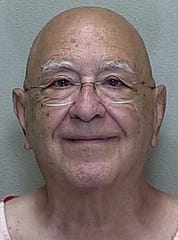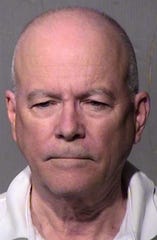5 Recently Charged Priests Reported to Michigan Police, Prosecutors Years Ago
By Beth LeBlanc
More than 17 years later, DeLorenzo was arrested in the backyard of his Summerfield, Florida, home on remarkably similar allegations by the Michigan attorney general's office. On May 23, police collected the 80-year-old priest's medicine and took him to the Marion County Sheriff’s Office, where he waived his Miranda rights and allowed police to search his phone, according to a Michigan State Police report obtained through a Freedom of Information Act request. DeLorenzo is one of at least five priests charged this year with sexual misconduct in Michigan who had been reported by the state's dioceses to police or prosecutors years before — in some cases multiple times by multiple victims. The other priests are the Revs. Neil Kalina, Jacob Vellian, Brian Stanley and Timothy Crowley. But, in large part, charges earlier weren't filed because the statute of limitations had run its course and barred prosecution, or because a victim was unwilling to file a police report,according to a Detroit News review of government documents. Each of the priests charged by Nessel had been removed from ministry in Michigan by their dioceses based on the allegations months or years prior to being charged. Some of the latest misconduct charges are possible due to new allegations or old victims who finally filed a police report. In others, Michigan Attorney General Dana Nessel used a legal provision to charge priests whom local prosecutors believed couldn’t be prosecuted due to the passage of time. The state has "an obligation, a responsibility and the authority" to pursue justice in the clergy abuse investigation, Nessel said in a Tuesday statement. "One of the most important things our office can do for crime victims — especially those victims who have suffered in silence and have been ignored for so long — is to honor them and their stories by aggressively continuing to pursue the investigation begun by my predecessor," Nessel said. The new prosecutions don’t mean that Nessel’s office is assured of succeeding. Charges in one case have been dismissed, though Nessel’s office plans to appeal. The sometimes decades-old sexual assault allegations remain complicated cases to prosecute, experts said. "The passage of time is more likely to hurt the prosecution than the defendant," said Richard Friedman, a law professor at the University of Michigan Law School. "Time is going to tend to create doubt." Nessel in May charged DeLorenzo with six counts of sexual misconduct related to allegations dating back to 1995. A lawyer for DeLorenzo didn't return a call for comment.
The priest had faced allegations before.At least seven times an alleged victim or the Diocese of Lansing had reported sexual misconduct allegations against DeLorenzo to prosecutors since 2002, according to a spreadsheet and emails from the Genesee County Prosecutor’s Office. Documentation of the reports were found in county archives after the prosecutor's office told The News in May that it had only received two prior notifications of allegations against DeLorenzo in 2018 and 2019. Victims' names on the earlier reports reviewed by The News were redacted out of privacy concerns, so it is difficult to know whether they are the same people whose allegations led to eventual charges from Nessel’s office. Nessel's office confirmed that one of the three alleged victims involved in her office's case against DeLorenzo is believed to have been reported by the diocese to the Genesee County Prosecutor's Office in 2018. At that point, the attorney general's investigation was gaining speed and the complaints were referred to Michigan State Police and Nessel's office. Stopped limitations clock DeLorenzo, Kalina, Vellian and Crowley all were charged on decades-old allegations that would usually be barred by the statute of limitations, but are fair game for prosecution through a provision in the state’s sexual assault law. Called tolling, the provision stops the clock on the window of time in which a person can be charged after an alleged sexual assault, which was a six-year window up until 2001. In the priests' cases, the pertinent statute of limitations clock paused as soon as they left the state after an alleged assault. DeLorenzo was charged in May with three counts of first-degree criminal sexual conduct and three counts of second-degree criminal sexual conduct on allegations that he fondled and raped a boy who attended primary school at Holy Redeemer in Burton between 1995 and 1999. He faces life in prison if convicted. DeLorenzo's alleged assaults of the boy still fall within the statute of limitations, Nessel's office said, because the state law was changed in 2001 to eliminate a statute of limitations for first-degree criminal sexual conduct. The shift was made within the prior six-year statute of limitations window, her office said. Nessel’s office is using tolling for the second-degree criminal sexual conduct charges against DeLorenzo because the 2001 changes for second-degree only extended the statute of limitations to 10 years. The window was extended to 15 years in Michigan last year. A 2002 allegation investigated by police did not result in charges because of the statute of limitations, and a 2003 allegation was not charged because prosecutors weren't sure they could meet the burden of proof, according to the Genesee County Prosecutor's Office and Michigan State Police documents. In three cases between 2009 and 2016, the prosecutor’s office noted the absence of a police report they could review to consider charges, according to a database prepared by the Genesee County Prosecutor's Office. In nearly all of those cases, the prosecutor’s office highlighted concerns about the statute of limitations. A 2018 report was investigated by the State Police, the prosecutor's office said, and a 2019 case involved a person who had died nearly a decade earlier. Between 2005 and 2017, the Genesee County Prosecutor's Office received no official police report regarding an allegation against DeLorenzo, said former Deputy Chief Assistant Prosecutor Randy Petrides, a 38-year employee who served as chief assistant to Prosecutor David Leyton from 2005 through 2017. Even if a victim eventually filed a police report, the statute of limitations remained a concern, he said. "That was in the back of mind," Petrides told The News. "...But that is a final decision made if and when we get an investigation. We never got one.” If Nessel’s office was able to find a way to still charge the old cases, “more power to them,” he said. “We did not have a sense that Fr. DeLorenzo had left the state for a long enough time to toll it,” Petrides said. “We were not aware that he had left the state at all.” The strict limits on the time frame during which a person must be charged after an alleged assault exist because of the difficulty in proving a case with old evidence, deceased witnesses or limited recall, said UM's Friedman. The time frame was eventually extended for sexual assault in part to account for the factors that might keep a young victim from reporting, especially in a case involving an authority figure or a repression of memories, Friedman said. While the burden remains heavy on prosecutors in older cases, the changes in law create a legal environment more "hospitable" to those challenges, he said. "I don’t think any of these changes make prosecution more complicated; they make prosecutions possible that wouldn’t have been possible otherwise," he said. Crowley case challenges Charges against three other priests involving tolling remain in litigation. In October, Ann Arbor District Judge Joseph Burke dismissed charges against Crowley, ruling that the statute of limitations did not apply because the incident that would have fallen within the statute of limitations happened after the boy had turned 16. Kalina is scheduled for a competency hearing later this month, while Vellian remains in India as the attorney general’s office works toward extradition. Crowley’s case ran into issues. Burke dismissed eight criminal sexual conduct charges against Crowley because he ruled the six-year statute of limitations had expired before Crowley moved out of state. Nessel’s office is appealing. Alleged assaults occurring within the six years prior to Crowley’s departure had taken place after the alleged victim turned 16, the judge ruled. But acts that happened prior to the victim’s 16th birthday occurred more than six years prior to Crowley’s departure from the state. In 1993, the Diocese of Lansing paid a $200,000 settlement to the alleged victim in Crowley’s case and required the man to sign a non-disclosure agreement. Crowley was removed from ministry in the Diocese of Lansing, but went on to serve as chancellor for the Archdiocese of Anchorage in Alaska, despite warnings from the Michigan diocese.
When church protocol changed in 2002, Crowley was removed from the Anchorage archdiocese and reported to the Washtenaw County prosecutor’s office. The statute of limitations had not expired on the case the office received in 2003 and the prosecutor’s office likely would have charged Crowley at that time, Washtenaw County Prosecutor Brian Mackie said. But the charges eventually were denied, according to a memo from the prosecutor's office, because the alleged victim “adamantly opposes criminal prosecution.” “The victim’s reasons for opposing prosecution are compelling, and these charges are therefore denied,” the memo said. A primary concern of victims of sexual abuse, especially young ones, is the fear that they won't be believed, especially if it involves a member of a faith community or a male victim, said Rebecca Campbell, a professor of psychology at Michigan State University. "They are often not believed, or blamed for not being able to prevent this," said Campbell, who focuses on the psychological impact of the criminal justice system on sexual assault victims. "There’s still tremendous stigma and shame for male survivors to disclose.” Failure to report The unwillingness of victims to come forward also played a role in delayed prosecutions. The Genesee prosecutor's office noted the absence of a police report on three separate cases reported by the Diocese of Lansing. Two incidents allegedly occurred at St. Pius X in Flint Township in the 1970s and 1980s and were reported to the diocese in 2009 and 2013. But the Flint Township Police had no police reports on the allegations, according to an open records request. It was unclear whether the third victim ever made a police report. In a more recent instance in 2017, an alleged victim of Stanley first approached the Diocese of Kalamazoo and then asked the diocese to relay his concerns to the Coldwater Police Department.
The victim, who was one of at least three individuals to report being wrapped in plastic wrap or otherwise restrained by Stanley, did not return calls from Coldwater police. The police department ended that specific investigation without interviewing Stanley because the alleged victim “was un-cooperative and refused to contact me after several calls.” That report had been preceded by one to the Otsego Police Department that did not result in charges and followed by another to Coldwater police in August. Nessel's office charged Stanley with false imprisonment, and the priest has pleaded not guilty. His lawyer, Michael Hills, declined to comment further because of ongoing litigation. Contact: eleblanc@detroitnews.com
|
.
Any original material on these pages is copyright © BishopAccountability.org 2004. Reproduce freely with attribution.



